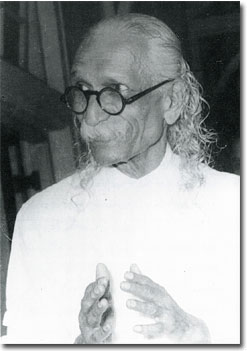Swami KUVALAYANANDA, founder of the KAIVALYADHAMA centre
The KAIVALYADHAMA Centre ( Kaivalya” meaning the ultimate step reached by the practising Yogi and "dhama" the abode) situated in LONAVLA in the state of Maharastra in INDIA is famous for its fundamental and applied research in yoga which began at the beginning of the 20th Century. Its founder, Swami KUVALAYANANDA wished to pass on the age-old yogic tradition which he himself had received from his master the great Bengali yogi PARAMAHAMSA MADHAVADAS MAHARAJ. In this optic, a research of the original manuscripts of the fundamental texts of yoga was undertaken, followed by critical editions in order to bring these texts to modern day readers. Alongside this work, he also wanted to throw a scientific light on the ancient science of Yoga. So this pioneer carried out his work surrounded by disciples, doctors and scientific researchers. These studies have been reported in the journal YOGA MIMAMSA since 1924 and continue today.
At the end of the 19th century and in the first half of the 20th century, a large number of Indians were at the heart of the profound restructuring of Indian society, both of its cultural and spiritual values, resulting in the eventual independence of their country in 1947. At first attracted by political actions when side by side with Sri AUROBINDO, Swami KUVALAYANANDA eventually chose to provide his contribution via the diffusion of a rational, solid and authentic practice of Yoga to a large public.
Impressed by this prominent figure, the Mahatma GANDHI requested his guidance in his personal practices. The DALAI LAMA in exile wished to meet him. The Pandit Jawarharlal NEHRU took a close interest in his work and the government of the young Indian republic officially acknowledged the KAIVALYADHAMA Centre.
